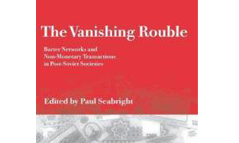Paul Seabright, The Vanishing Rouble: Barter Networks and Non-Monetary Transactions in Post-Soviet Societies, Cambridge University Press, Cambridge, 2000. Edited by Paul Seabright.
One of the most remarkable aspects of the transition process in the former Soviet Union has been the extent to which the economy has effectively become demonetized in recent years. At the time of Russia’s financial crisis of 1998 it was estimated that up to 70% of industrial output was being exchanged for barter. This book provides an accessible and authoritative analysis of barter in the former Soviet Union, addressing such questions as: What has brought about this demonetization and why have we not seen the same phenomenon on a widespread scale in central and eastern Europe? Does the nature of demonetization cast light on what underpins monetary transactions in industrial societies? What are the consequences for output and growth? Should the state intervene and how? Does the network character of many non-monetary transactions have implications for the role and value of social networks in complex modern societies?
Contributors: Paul Seabright, Jayasri Dutta, Canice Prendergast, Lars Stole, Caroline Humphrey, Alena Ledeneva, Simon Commander, Christian Mummsen, Sergei Guriev, Barry W. Ickes, Simon Clarke, Dalia Marin, Daniel Kaufmann, Bogdan Gorochowskij, Wendy Carlin, Steven Fries, Mark Schaffer, David G. Anderson, Nikolai Ssorin-Chaikov

